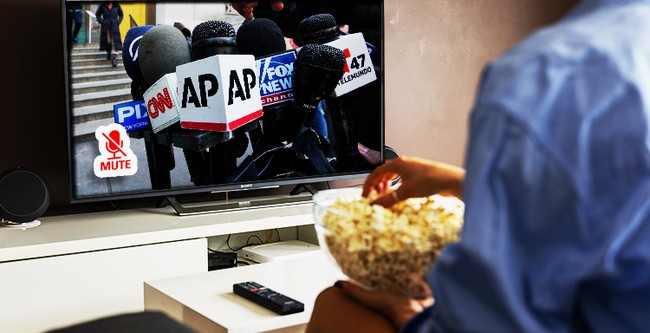PROTECT YOUR DNA WITH QUANTUM TECHNOLOGY
Orgo-Life the new way to the future Advertising by AdpathwayThe conflict between Israel and Iran is at a pivotal moment. What happens next depends on how the two countries respond to pressure coming from many directions. In some ways, it will also come down to just two men, Israeli Prime Minister Benjamin Netanyahu and the Supreme Leader of Iran, Ali Khamenei.
The World took a step back from the minute-by-minute turns in the fighting and looked at the histories and mindsets of each leader with Jeffrey Goldberg and Karim Sadjadpour. Goldberg is the editor-in-chief of The Atlantic, and he’s spent a lot of time getting to know Netanyahu as a leader while covering the Middle East. Sadjadpour is a senior fellow at the Carnegie Endowment for International Peace and a careful observer of Khamenei.
Carolyn Beeler: Since the Israeli bombing campaign started, what message has Supreme Leader Khamenei been sending to the Iranian people and the rest of the world?
Karim Sadjadpour: Well, his message is always one of defiance, but it obviously rings hollow, given that people haven’t heard from him publicly. He’s in a bunker somewhere, and so many of his top military and nuclear officials have been assassinated. He’s someone who, over the last 36 years, has really sung one tune that’s, you know, resistance, death to America, death to Israel. And that’s brought the country to financial ruin, political isolation and now military attacks. And Iranians haven’t really experienced this for four decades. So, it’s introduced major insecurity [and] disruption to the population. And, as of now, hasn’t shown any signs that he’s thinking of meaningfully compromising.
 In this photo released by an official website of the office of the Iranian supreme leader, Supreme Leader Ayatollah Ali Khamenei speaks in a ceremony meeting a group of officials, in Tehran, Iran, March 8, 2025. Office of the Iranian Supreme Leader via AP/File
In this photo released by an official website of the office of the Iranian supreme leader, Supreme Leader Ayatollah Ali Khamenei speaks in a ceremony meeting a group of officials, in Tehran, Iran, March 8, 2025. Office of the Iranian Supreme Leader via AP/FileAt this point, as you mentioned, much of Iran’s military leadership has been assassinated. Israeli bombing has destroyed a key infrastructure in Iran. What are Khamenei’s options at this point?
Karim Sadjadpour: He has very poor options, in part because the deal, which is likely to be offered to him right now, will be worse than the deal that would have been offered to them last week. Meaning that last week, President Trump was demanding that he stop uranium enrichment. I suspect, right now, what’s going to be demanded of him is not simply to dismantle his nuclear program, but to cease supporting these militias throughout the Middle East, like Lebanese Hezbollah, and to make significant compromises on some of his military technology, including his missile program. So, Ayatollah Khamenei has long believed that you should never compromise under pressure because that doesn’t alleviate the pressure, it projects weakness and invites even more of it. But at the end of the day, he is perhaps the longest-serving dictator in the world, he’s had pretty decent survival instincts, and he has a major decision to make … and that is, is he going to continue to defy the United States and risk President Trump potentially intervening in this war? Or will he agree to a compromise, which for him would be pretty humiliating, and he risks being perceived as weak at home, which is what every dictator wants to avoid.
 This combination image of pictures show President Donald Trump, left, addressing a joint session of Congress at the Capitol in Washington, March 4, 2025, and a handout of Supreme Leader Ayatollah Ali Khamenei attending a ceremony in Tehran, Iran, March 8, 2025. Ben Curtis/AP/File and Office of the Iranian Supreme Leader via AP/File
This combination image of pictures show President Donald Trump, left, addressing a joint session of Congress at the Capitol in Washington, March 4, 2025, and a handout of Supreme Leader Ayatollah Ali Khamenei attending a ceremony in Tehran, Iran, March 8, 2025. Ben Curtis/AP/File and Office of the Iranian Supreme Leader via AP/FileSome tough decisions there for him. Jeffrey, you’ve interviewed Netanyahu and spent a lot of time in Israel. What should we know about how Netanyahu is thinking and how he makes decisions at this moment?
Jeffrey Goldberg: Well, the interesting thing about Netanyahu is that, traditionally, he’s been very cautious about the use of military force. Oct. 7 changed a lot in Israel, [and] changed him as well. He’s always been, I mean, for 20, 25 years at least, focused on the existential threat of the Iranian nuclear program. For him, it’s a simple formula: The Iranians say they want to destroy the state of Israel. They sponsored groups that tried to destroy Israel and kill Israelis. They could not get close, therefore, to having a nuclear weapon, which, since Israel is so small, one bomb or two bombs would wipe out much of the population. He believed that it’s his almost holy mission to prevent a second Holocaust from happening. And for years, he’s been threatening to do something and hasn’t done it. Oct. 7 changed all the dynamics in the Middle East. The Iranians walked into a trap. In a lot of ways, the Iranians have made it very easy for Netanyahu to make these decisions. After the tremendous military failure on Oct. 7, 2023, by Israel, Israel then proceeded to dismantle much of Hamas [and] Hezbollah, which was Iran’s most potent external force. It’s dealing with the Houthis in Yemen, which is another Iranian proxy. Israel dealt earlier with much of the air defenses of Iran, in the previous round when Iran launched missiles at Israel. And so, I feel, despite his innate caution about taking on a regional superpower, Iran, I feel like he saw the moment that his whole life has been building toward, and he did not want to let it go, whether or not Iran was two weeks, three weeks or three months away from having a nuclear bomb, we don’t know. The Israelis say yes. The American intelligence has a different view of this.
As does the IAEA.
Jeffrey Goldberg: As does the IAEA, [that] said that [Iran] was in violation, obviously, of the rules. But I think there’s a new calculus in the Israeli mindset that Netanyahu reflects, which is if you say that you’re going to kill us all — which was what Ayatollah Khamenei has said and other leaders have said — and if you sponsor groups that murder Israelis, we’re just not going to sit by and allow you to do that. Now, the big question, obviously, is what can he ultimately do? He does not have the capability alone of destroying some of the buried elements of the Iranian nuclear program. This is where Donald Trump comes in as a key player.
 Israeli Prime Minister Benjamin Netanyahu speaks during a press conference in Jerusalem, May 21, 2025. Ronen Zvulun/Pool Photo via AP/File
Israeli Prime Minister Benjamin Netanyahu speaks during a press conference in Jerusalem, May 21, 2025. Ronen Zvulun/Pool Photo via AP/FileRight, which I want to get to in a second. But is there another potential endgame that Netanyahu is looking for? He has said that now is the time for Iranians to rise up, and this is the moment for Israel to begin remaking the Middle East. Is Netanyahu looking for regime change in Iran?
Jeffrey Goldberg: Seems like it. What’s interesting about that is he does not share the kind of, let’s say, idealism that regime change is possible and that Iran, Iraq, all these other countries have become democratic and Western-leaning. He has not traditionally shared that view. I don’t think he particularly cares about regime change. Obviously, from the American, European, Israeli perspective, a non-terrorist-supporting government Iran that is better to its people would be a good thing. But I think, unlike some people, especially in Washington, who believe that the overthrow of the supreme leader would lead to a better outcome, I think Netanyahu is fully gripped by the idea that, it goes to this cliché, you know, the devil you know versus the devil you don’t know. There’s no expectation on Netanyahu’s part that the Iranian leadership is going to get better. I think, and Karim might disagree, but I think that at bottom is that Netanyahu saw an opportunity to disarm by force, Iran, and decapitate its military and intelligence and Air Force leadership, and took the shot.
 An explosion caused by a projectile strike illuminates the skyline in Tel Aviv, Israel, early Saturday, June 14, 2025. Leo Correa/AP
An explosion caused by a projectile strike illuminates the skyline in Tel Aviv, Israel, early Saturday, June 14, 2025. Leo Correa/APKarim, do you agree or disagree with that?
Karim Sadjadpour:I totally agree with Jeff. And the context in this situation is that from 1979 to the present, the Islamic Republic of Iran has sought to eradicate Israel. They’ve been very open in saying that. “Death to Israel” is their slogan. They’ve spent tens of billions of dollars on regional militias that are opposed to Israel’s existence. In some ways now, Netanyahu is perhaps repaying that favor, and perhaps without making it explicit, he implicitly said that if what results from this is a change in the Iranian regime, that would be a good outcome. And the challenge that Ali Khamenei has is that for decades, he was able to essentially fight Israel from Arab soil, from Lebanon, from Syria, from Yemen, from Iraq. And Netanyahu has changed that dynamic since last fall. And it’s too soon to say the impact this will have in Iran politically, but I think a lot of Iranian citizens are really fed up. They’re fed up with this death to America culture and death to Israeli culture of 1979. And they want a government that prioritizes the country’s own economic and national interests. They want the slogan to be “Long live Iran,” not “Death to Iran,” “Death to Iraq.”
Carolyn Beeler: Kareem, Tehran has reportedly told Arab officials it would be open to coming back to the negotiating table as long as the US does not join Israel in its military offensive. Why do you think US Involvement is Iran’s red line?
Karim Sadjadpour:Well, because the US has the plane and the bunker-buster bombs that could totally destroy Iran’s nuclear facility at Fordo. So, this is a regime, as I mentioned, which, at the end of the day, they’re homicidal towards their own people, but they’re not suicidal. They want to remain in power. And the United States entering this war could be deeply destabilizing and obviously humiliating for the regime. So, if they can prevent that outcome by, perhaps, showing they’re amenable to a diplomatic compromise, that’s something that they will certainly see in their interest.
Carolyn Beeler: Jeffrey, Karim was just talking about how US involvement is Iran’s red line because of the military capabilities the US brings with it. What does Netanyahu want from President Trump and the US in the midst of this conflict?
Jeffrey Goldberg: He wants something very simple: He wants large, large bombs delivered by large, large planes over a particular site, obviously more than one site, but Fordo is the main site. And he wants those facilities to be physically eradicated. I don’t think [that] either Trump or Netanyahu is seeking regime change or necessarily believes that it would lead to a better outcome than the current government. I think they’re kind of old-fashioned in the idea that there’s this enemy country, it hates us, it’s killed our people, both Americans and Israelis, and we’re going to neutralize the threat. And whatever happens over there, it is fine. It’s very kind of Jacksonian-American politics rather than sort of Bush-y and neoconservative politics. It’s don’t mess with us, we’re gonna neutralize your threat to us, and so be it. And this is what Khamenei should be worried about, actually. I don’t think there’s an American plan to destabilize the regime, but if it destabilizes it, that’s a byproduct of it, and I don’t think Trump or Netanyahu particularly care.
 Flames rise from an oil storage facility after it appeared to have been hit by an Israeli strike in Tehran, Iran, early Sunday, June 15, 2025. Vahid Salemi/AP
Flames rise from an oil storage facility after it appeared to have been hit by an Israeli strike in Tehran, Iran, early Sunday, June 15, 2025. Vahid Salemi/APIs it clear exactly what Netanyahu is getting from Trump and the US right now? I mean, Trump has acknowledged that he knew about these strikes before they happened. Obviously, there’s a lot of intelligence sharing between the US and Israel. Anything more?
Jeffrey Goldberg:I wouldn’t dare try to guess what Trump’s plans are or thinking is, because it shifts with the wind. I will say this, and maybe Karim has better knowledge of this than I have, but I will say that he has been consistent on the point, even going up against some MAGA star awards, that Iran cannot go nuclear. And Trump understands that American presidents, going back very long to the past, have stated that Iran, a stated enemy of the United States, cannot have a nuclear weapon. And Trump is in line with that. So, there is a through line, which makes me believe that it is highly plausible that Trump will send B-2 bombers over Fordo at some point in the near future and drop those bunker-busting bombs and try to take out that facility, once and for all. I do think it’s highly plausible that that could happen. I don’t think Trump is then going to go say, “I’m going to rebuild Iran.” I think he’s like, “I am going to disarm you,” essentially, and then move on.
But that would in and of itself have huge implications.
Jeffrey Goldberg: It has huge implications, but if it’s successful, it actually does neutralize the Iranian nuclear threat.
Karim, you mentioned that the country doesn’t want a death to America slogan, Iranians, that is, they want an Iranian prosperity kind of ethos around the country. Do you think that the recent conflict, the military strikes, are changing public attitudes in a meaningful way?
Karim Sadjadpour:I think what these kinds of crises do are amplify people’s existing dispositions. So, if last week you were a supporter of the regime and an opponent of America-Israel, you have more ammunition to feel that way. And if last week you were an opponent to the regime, and said, “This is a regime which puts its own ideological interests ahead of our national interests,” there’s more fodder to feel that way. I think it just further polarizes people’s existing dispositions. And back to Trump for a second, it was only last month when he was visiting Riyadh, Saudi Arabia, that Trump ridiculed nation builders and regime changers, interventionists, he said they’ve destroyed more nations than they’ve built, and they intervene in societies which they didn’t understand. So, I think that’s right that his instincts are to say, you know, how you govern yourself is not us, not our problem, we’re not going to spend money on nation building. But, he probably sees that this operation is now, as an Israeli military general said, you know, Israel has cleared the skies from Iran. Israel took the big risks, and now it’s a fairly free target for the United States, if they want to get involved. That goes to big questions about how some of Trump’s MAGA base will feel about America being sucked into yet another Middle East war. But certainly, Trump’s position on this issue has evolved considerably. It appeared as recently as last week that he didn’t want Israel to take military action, and he was committed to trying to do his own diplomatic deal with Iran.
 Iranian demonstrators carry caricatures of the Israeli Prime Minister Benjamin Netanyahu during a rally commemorating anniversary of 1979 Islamic Revolution that toppled the late pro-US Shah Mohammad Reza Pahlavi and brought Islamic clerics to power, in Tehran, Iran, Feb. 10, 2025.Vahid Salem/AP
Iranian demonstrators carry caricatures of the Israeli Prime Minister Benjamin Netanyahu during a rally commemorating anniversary of 1979 Islamic Revolution that toppled the late pro-US Shah Mohammad Reza Pahlavi and brought Islamic clerics to power, in Tehran, Iran, Feb. 10, 2025.Vahid Salem/APA lot has changed in just days. Without asking either of you to look into your crystal balls to try to guess how this will end, I am wondering what you will both be looking to in the coming days and weeks to give you a sense of how things are going. Jeffrey, I’ll start with you.
Jeffrey Goldberg:Well, I mean, we’re all waiting to see what an unpredictable president does. I’m waiting to see how many more ballistic missiles Iran has in its possession and uses against Israel. Obviously, it’s doing damage to Israeli civilian areas. But every missile that they fire is one less missile they have in their armory. I think we’re waiting to see if the US just does the deed and tries to negotiate, with bombs, the destruction of the Iranian nuclear program. And then, of course, in the long term or medium term, it will be very, very interesting to see if the Islamic Revolutionary Guard Corps, the basis of the revolution, if they hold on to power. They’re very brutal, as we’ve seen in the Green Revolution in other places and other times. So, it’s completely plausible that they do hold on, but the open question is how long can the regime hold on?
So, does the US get involved, and what happens within Iran. What are you looking at in the days and weeks ahead, Karim?
Karim Sadjadpour:You know, in contrast to previous US administrations where you’re trying to get a sense of what people are thinking at the Pentagon or CIA or State Department, really, the big decision is going to be made by the president. He’s, as we’ve seen, incredibly mercurial, and can be heavily influenced by day-to-day events. And then, as Jeff alluded to, how does this play out inside Iran? One thing I’d be looking to see is if two prerequisites for regime instability are elite defections, elite fissures and then popular protests. And usually, those two things reinforce one another. So far, we haven’t seen either. We’ve seen elite assassinations, but not yet fissures and defections. Once the aerial bombardment stops, do you start to see signs of popular protests? You know, that will be important. And again, whether or not this Israeli attack had even happened, Iran is soon going to be experiencing a leadership transition, because they have an 86-year-old supreme leader. And it’s a big question mark about how long this regime and revolution can last, and what comes next.
Parts of this interview have been edited for length and clarity.












 English (US) ·
English (US) ·  French (CA) ·
French (CA) ·  French (FR) ·
French (FR) ·